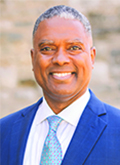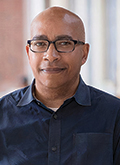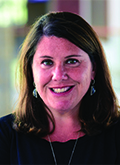Expanding the circle
Senior fellows bring outside expertise to the Center
Associate White House counsel. Virginia secretary of education. Jazz director and radio host. These are just a few of the credentials that distinguish the Miller Center’s current class of senior fellows—individuals who bring practical expertise to enhance the Center’s research and broaden its reach.
Every year, the Center welcomes a new group of senior fellows. In addition to former government practitioners and professionals, new fellows include academic faculty appointed at the University of Virginia and other institutions
and scholars engaged in research projects with a Miller Center faculty member or fellow.
“We wanted to bring together experts who could talk about the importance of presidential policy across a wide range of domains, from health policy and immigration to national security and economic policy,” explained David Leblang, the Center’s Randolph P. Compton Professor and director of policy research. Leblang structured the fellows program in 2017.
We wanted to bring together experts who could talk about the importance of presidential policy across a wide range of domains
A committee of Miller Center faculty and staff, chaired by Leblang, solicits fellow nominations from the Center’s community throughout the year. The committee vets the nominations and then presents their recommendations to Miller Center Director and CEO William Antholis for approval. In addition to incorporating senior fellows in events, programs, and research, the Center promotes the work of its fellows, who serve renewable two-year contract terms.
The senior fellows program, which currently includes 10 practitioner and 35 faculty fellows, is not simply a one-way arrangement benefiting the Center. As four members of the current senior fellows class explain, their affiliation with the Center also enhances their own research and scholarship.
GERARD ROBINSON

Before joining the Miller Center in 2024, “there weren’t a lot of opportunities for me to share my work through the lens of American presidents,” said Gerard Robinson, a professor of practice in public policy and law at the University of Virginia Frank Batten School of Leadership and Public Policy with a joint appointment at UVA’s School of Law. “Primarily, we focus on what Congress has done, what governors have done. What about our presidents?”
As a faculty senior fellow, Robinson said he has appreciated the opportunity to engage with and learn from other scholars, as well as “challenge, supplement, and enhance my own research about the American presidency.”
Robinson’s areas of expertise include criminal justice reform, race in American institutions, K–12 and higher education, and the function of nonprofit organizations in civil society. He is particularly interested in the role of education inside prisons, both in the U.S. and globally.
“The U.S. leads the world in the number of people who are incarcerated, at 1.9 million people,” explained Robinson. “Even though the United States makes up four percent of the global population, we make up 16 percent of the people around the world who are incarcerated.”
The U.S. leads the world in the number of people who are incarcerated, at 1.9 million people
Between 2023 and 2024, Robinson traveled to Brazil, Germany, Kenya, and Norway to learn about programs and public policies designed to help incarcerated adults and juveniles. He visited prisons, reentry centers, and colleges that trained correctional officers. He also met with government officials and spoke with prison guards and incarcerated students.
“The goal was to go and see what other people are doing right, what they’re doing wrong, and what we as Americans can bring into our country as well as share with others globally,” Robinson said.
Before joining academia, Robinson served as commissioner of education for the state of Florida and as Virginia’s secretary of education under Governor Robert McDonnell. He has also served as executive director of the Center for Advancing Opportunity, a Washington, D.C.–based research and education initiative, and president of the Black Alliance for Educational Options. He has been a fifth-grade teacher in Los Angeles, a legislative liaison for the superintendent of the District of Columbia Public Schools, and a legislative aide in the California and Virginia legislatures.
In February 2025, Robinson hosted a workshop for Center faculty and fellows discussing the role that presidents from the 1960s to present have played in “how we think about punishment” and “how that influences public policy,” he said. The workshop also explored how these policies affect incarcerated people and people on probation and parole.
Robinson aims to lead future convenings on criminal justice reform at the Center, including an event assessing the impact of President Lyndon Johnson’s 1964 “War on Crime.”
The goal was to go and see what other people are doing right, what they’re doing wrong, and what we as Americans can bring into our country as well as share with others globally
ASHLEY DEEKS

Before entering academia, Ashley Deeks had a distinguished career in the executive branch. She served in numerous U.S. State Department positions, including assistant legal adviser for political-military affairs in the department’s Office of the Legal Adviser.
The Miller Center’s reputation for public conversations between executive branch officials and academics inspired Deeks to join the Center in 2019. She is a faculty senior fellow at the Miller Center and the Class of 1948 Professor of Scholarly Research in Law at the University of Virginia School of Law.
“It’s great to know that there are academic, policy, and legal experts in the Miller Center family who are interested in the same types of issues that I’m interested in, [fostering a] robust culture of thinking about the role of the executive,” said Deeks, who also directs UVA’s National Security Law Center.
An expert on international law, national security, terrorism, intelligence, and the laws of war, Deeks has led Center events focused on domestic and foreign policy. In September 2024, she moderated a discussion with Kenneth L. Wainstein, under secretary for intelligence and analysis for the Department of Homeland Security, examining the challenges facing the country’s intelligence program and election security.
During Joe Biden’s presidency, Deeks returned to the executive branch, serving as associate White House counsel and as deputy legal adviser to the National Security Council.
It’s great to know that there are academic, policy, and legal experts in the Miller Center family who are interested in the same types of issues that I’m interested in
In her forthcoming book, The Double Black Box: National Security, Artificial Intelligence, and the Struggle for Democratic Accountability, Deeks identifies key challenges in overseeing government uses of artificial intelligence (AI) for military and intelligence purposes. In addition, she scrutinizes government secrecy surrounding AI.
Deeks’s recent research focuses on the breadth of the president’s executive authority. In an article published in the University of Pennsylvania Law Review, she closely examined the national security powers that the president delegates to executive agencies.
In partnership with UVA law professor Kristen Eichensehr, who is also a Miller Center faculty senior fellow, Deeks published an article in the Virginia Law Review examining the problems of “frictionless government.”
“We started to notice there are some potential downsides when you have both the House and Senate [and] the president all pulling in the same direction—that can produce too much agreement,” explained Deeks. She noted examples in U.S. history, including the internment of Japanese Americans during World War II.
“There may be situations that should at least give us pause,” continued Deeks, “and prompt us to try to re-introduce some elements of friction into policymaking.”
There may be situations that should at least give us pause
KEVIN K. GAINES

Since joining the Miller Center in 2019, Kevin K. Gaines, the Julian Bond Professor of Civil Rights and Social Justice at the University of Virginia, has facilitated public conversations about the intersection between African American history, the civil rights movement, and current public policy issues.
“This is why I’m part of the Miller Center,” said Gaines, who is a faculty senior fellow and previously served as the W. E. B. Du Bois Professor of Africana Studies and History at Cornell University. “I want to focus on having conversations that go beyond the way these issues are discussed in the mainstream media and in a lot of public fora.”
At the Center, Gaines has shared his expertise on issues concerning race and racism, including police brutality, Black Lives Matter protests, and the criminal justice system. Most recently, he moderated a post-2024 election analysis event in January 2025 discussing how the politics of race and gender affected the election and current challenges facing voting rights.
I want to focus on having conversations that go beyond the way these issues are discussed in the mainstream media and in a lot of public fora
In the classroom, Gaines incorporates the Center’s presidential resources into his lectures. While teaching a UVA course in fall 2024 on the civil rights movement, he played for his students a 1963 phone conversation, drawn from the Presidential Recordings Program’s archive, between President Lyndon Johnson and Rev. Martin Luther King Jr.
Three days after the assassination of President John F. Kennedy, “to King’s astonishment, Johnson tells King that he is going to put all of his support behind passing the federal civil rights legislation that Kennedy had introduced, [as] a tribute to Kennedy,” Gaines explained.
“It’s amazing for students to hear the astonishment in King’s voice when he hears something that he wasn’t expecting,” Gaines continued. “The ability to use those [recordings] in the classroom brings history alive for students.”
During future Center events, Gaines plans to discuss the history of the African American electorate, as well as African American contributions to American democracy, including art, music, and literature. A former jazz director, radio host, and member of the Detroit Jazz Festival advisory board, Gaines especially enjoys teaching about the history of jazz.
“Jazz is a field that is about more than music,” Gaines said, “and has touched on American society and politics in many ways.”
Jazz is a field that is about more than music
JENNIFER LAWLESS

The Miller Center’s diverse intellectual community has exposed Jennifer Lawless “to political scientists and practitioners whose work is instrumental in shaping my own.”
“Forging those connections [is] key to being a successful scholar,” said Lawless, UVA’s Leone Reaves and George W. Spicer Professor of Politics and chair of the UVA Department of Politics. For the politics department, the Center is particularly “vital for ensuring that our faculty members are able to be productive [and] engaged in wider policy debates—[that] makes them stronger political scientists.”
Since joining the Center as a senior fellow in 2019, Lawless has moderated and participated in numerous events, sharing her expertise on political ambition, campaigns, and elections. She’s in high demand from journalists as an expert who offers trenchant analysis of fast-moving political developments and is regularly quoted by the nation’s most influential print and broadcast outlets.
Forging those connections [is] key to being a successful scholar
The author or coauthor of nine books, Lawless’ most recent, News Hole: The Demise of Local Journalism and Political Engagement, won the Harvard Shorenstein Center 2023 Goldsmith Prize for Best Academic Book.
In her forthcoming book, the third edition of It Takes More Than a Candidate: Why Women Don’t Run for Office, Lawless and coauthor Richard L. Fox sound an alarm about the systemic gender gap in political ambition and the challenges women face navigating the candidate emergence process. The book expands on the first and second editions, published in 2005 and 2010, respectively.
Drawing from national surveys of more than 10,000 potential female candidates in 2001, 2011, and 2021, the book shows that “women were about a third less likely than men to have considered running for office—even though on paper they looked exactly the same [and] had the same professional and political interests” as male candidates, explained Lawless.
“Although there’s been major societal change over the last 20 years when it comes to women’s representation and presence in politics, [the] gender gap in political ambition is the same size now as it was two decades ago,” stressed Lawless. “If we care about democratic legitimacy and a government that feels open to 50 percent of the population, we have a long way to go.”
If we care about democratic legitimacy and a government that feels open to 50 percent of the population, we have a long way to go